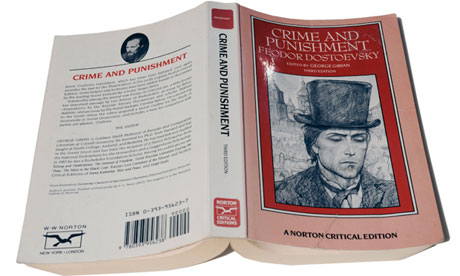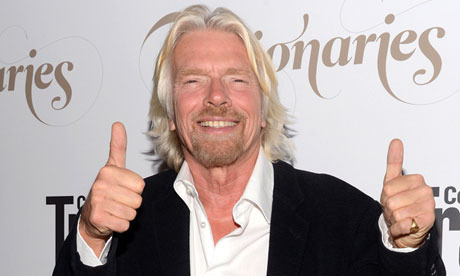Everythingism is the deadly combination of perfectionism plus narcissism plus utter laziness – which explains why I haven't read Crime and Punishment

Crime and Punishment: details available on Wikipedia. Photograph: CBW/Alamy
When I was pregnant, someone told me that she read Dostoevsky novels to her baby, both in the womb and after he was born. Apparently, at about two months old, he would respond with delight every time he heard the character names he had heard so many times in utero.
Massively annoyed by this insufferable woman and her competitive wankery, I resolved to go home and do exactly the same thing. Only I had never read any Dostoevsky, and wasn't sure that I could be arsed, in my seventh month of gestation, to begin a literary journey into desperate horse-flogging Russians and Siberian internment camps. So I went straight to the Wikipedia page for Crime and Punishment and skipped to the list of character names instead.
"Raskolnikov! Svidrigailov! Dunechka!" I barked at my foetus for no discernible reason, the laptop balanced precariously on my bump, while my internal smugometer wavered somewhere between pride and existential despair. A little like the characters in the books. Perhaps.
It was some time after this that I took a long, soft look at my slapdash, half-arsed approach to life, and realised that I am an everythingist. This is a word I have invented to describe the sort of person who is greedy for the benefit of all new experiences, but unwilling to put the work in to fully commit to any of them. An everythingist leaves no experiential stone unturned, which means doing absolutely everything by halves. It is the deadly combination of perfectionism plus narcissism plus utter laziness. It will get you nowhere in the end. Halfway there at best. Every time an everythingist's mother opens her mouth, the words "oh just bloody well get on with it" come out.
Here's how to tell if you, too, are an everythingist. Do you clutch your phone in your hand at all times, like a beacon against the cold, a magic talisman with its promise of otherness, betterness, of more attractive people desirous of your company elsewhere? Does it ensure you are unable to quite go with a plan or be in the moment because of all the other plans and moments where you might be, cheating on yourself with your other selves? Does your phone give you FOMO (AKA fear of missing out) for the party you're not at, even when you're at it? Did the news that Prism could be spying on all of our data give you a giddy rush when you thought that one of the lockdown powergeeks might be looking in and realising that you – you! – are the chosen one? Do you tend to fall asleep in your clothes, just in case the revolution should begin outside your bedroom window in the night?
Do you, like me, think that fairytale endings will magically happen to your life – ie, you will fall in deep rewarding love and raise daughters with Rapunzel hair in a beautiful Welsh farmhouse one day, writing novels on a typewriter, milking your nanny goats at dawn? Of course, this all will have to happen magically as you absolutely refuse to give up nightclubs and the closest you have come to milking your nanny goats at dawn was all a case of mistaken identity and that restraining order for going within a 40-metre ring of the late-night Turkish greengrocers is a gross infringement on your civil liberties, which you will sort out as soon as you find the bit of paper they wrote it on.
The everythingist can't be tied down by a job and so they work freelance (ie are self-unemployed). They don't want to be restricted by narrow labels like straight or gay because they believe their sexuality to be a fluid concept (i.e. they keep getting dumped). They are breathlessly addicted to their youth, despite being 12 years older than their parents were when they had them; can't read a book to the end because they've already started two more; and they need to know, at all times, that they could, in theory, if they wanted to, at any point, run away to Rio de Janeiro.
The everythingist works from home, revelling in their freedom to go for a walk in the sunshine while other sad jobsworthy losers are stuck at their desks with not so much as a freelancer's liedown to look forward to. The everythingist has been planning this walk in the sunshine for 17 days now, having been quite distracted by all the freelancer's liedowns that it is their right and freedom to enjoy. In their lunch hour. I mean, why not? It's not as if there's any lunch.
If you are not an everythingist, and you're one of those people who gets stuff done and gets over it – I realise now that you have the greatest freedom of all. The freedom to finish things, and not have all your half-read books, half-written books and half-experienced experiences clanking around your neck like shells. I can only apologise for how I used to giggle at you for being boring and keeping lists and being on time while I dashed over half an hour late to meet you, hopes and dreams blinding my eyes so that I couldn't read a bus timetable. I'm so sorry now. For everything.






